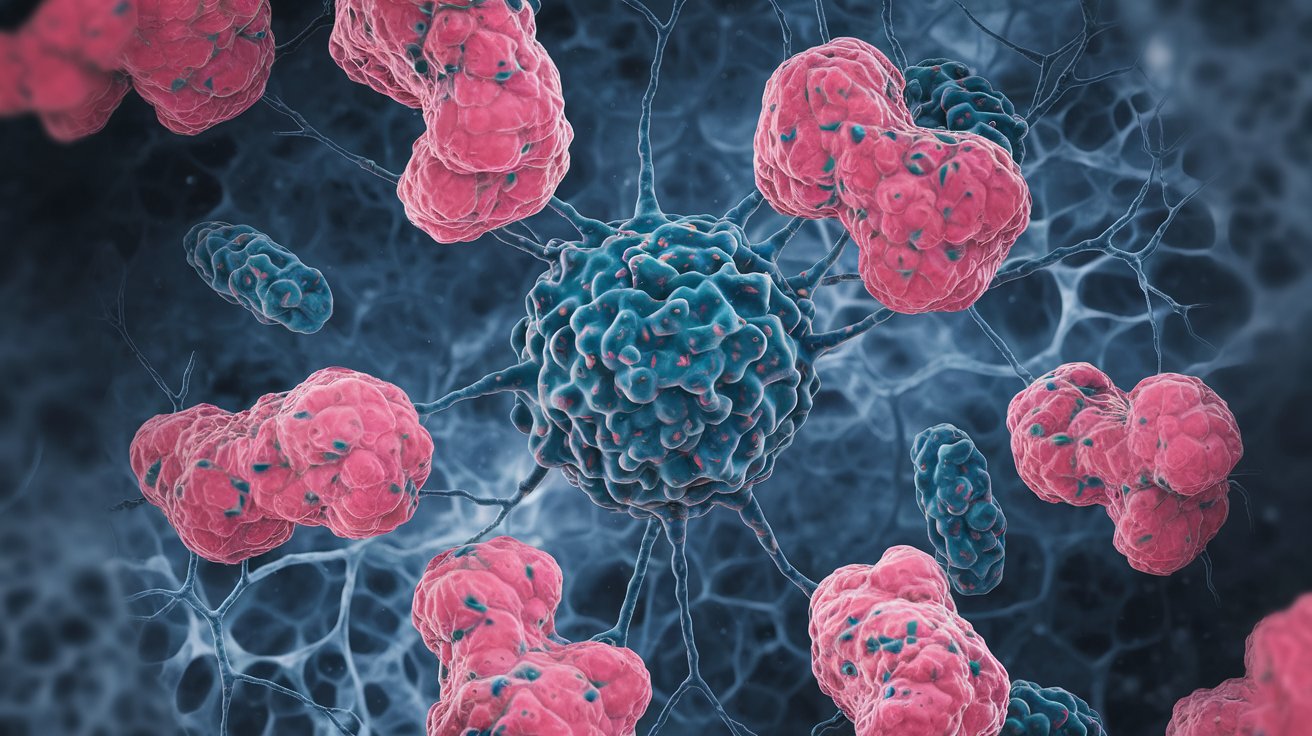
Carcinoma is a type of cancer that begins in the epithelial cells, which line the inside and outside surfaces of the body. This category includes many common cancers like breast, lung, and colon cancer. Did you know that nearly 10 million people worldwide died from cancer in 2020? Carcinoma plays a major role in this staggering number. Understanding carcinoma involves knowing its types, risk factors, symptoms, and treatment options. From squamous cell carcinoma to adenocarcinoma, each type has unique characteristics and challenges. By learning more about carcinoma, we can better grasp its impact and the importance of early detection and prevention.
Key Takeaways:
- Carcinoma is a common type of cancer that starts in the body's lining cells. Lifestyle choices, genetic factors, and early detection play crucial roles in prevention and treatment.
- Understanding the risk factors, symptoms, and treatment options for carcinoma can help improve survival rates and reduce the global impact of this prevalent disease.
What is Carcinoma?
Carcinoma is a type of cancer that begins in the epithelial cells. These cells line the inside and outside surfaces of the body, including organs and glands. Carcinoma is the most common type of cancer.
- Definition of Carcinoma: Carcinoma originates in epithelial cells, which form the lining of organs and glands.
- Prevalence of Carcinoma: Nearly 10 million deaths worldwide in 2020 were due to cancer, with carcinoma being a major contributor.
- Types of Carcinoma: Includes squamous cell carcinoma, adenocarcinoma, transitional cell carcinoma, and small cell carcinoma.
Risk Factors for Carcinoma
Understanding the risk factors can help in prevention and early detection. Several lifestyle choices and genetic factors can increase the risk.
- Tobacco Use: Smoking is a leading cause of lung, oral, and other cancers.
- Genetic Predisposition: Inherited mutations can heighten the risk of certain carcinomas.
- Radiation Exposure: Ionizing radiation can cause mutations that lead to cancer.
- Infections: Viruses like HPV and hepatitis B and C are linked to various carcinomas.
Symptoms of Carcinoma
Symptoms vary depending on the type and location of the carcinoma. Early detection can significantly improve outcomes.
- Breast Cancer Symptoms: Lumps, changes in breast shape, or nipple discharge.
- Lung Cancer Symptoms: Persistent cough, chest pain, or difficulty breathing.
- Colon Cancer Symptoms: Blood in stool, changes in bowel habits, or abdominal pain.
Diagnosis Methods
Early and accurate diagnosis is crucial for effective treatment. Various methods are used to diagnose carcinoma.
- Imaging Tests: CT scans, MRI, and PET scans help visualize tumors.
- Biopsy: Tissue samples are examined under a microscope.
- Blood Tests: Detect tumor markers or genetic mutations.
Staging of Carcinoma
Staging helps determine the extent of cancer spread, which is vital for planning treatment.
- TNM System: Assesses tumor size, lymph node involvement, and metastasis.
- Stage I: Early-stage cancer with minimal spread.
- Stage IV: Advanced cancer with widespread metastasis.
Treatment Options
Treatment varies based on the type and stage of carcinoma. Multiple approaches may be used.
- Surgery: Removal of the tumor and affected tissues.
- Chemotherapy: Drugs used to kill cancer cells.
- Radiation Therapy: High-energy rays to destroy cancer cells.
- Targeted Therapy: Drugs targeting specific genetic mutations.
Survival Rates
Survival rates differ significantly depending on the type and stage of carcinoma.
- Breast Cancer: 5-year survival rate is around 90%.
- Lung Cancer: 5-year survival rate is about 20%.
- Colon Cancer: 5-year survival rate is approximately 65%.
Cancer Statistics
Cancer affects millions of people worldwide. Understanding these statistics can help in planning and prevention.
- New Cases in the U.S.: Estimated 2,001,140 new cases in 2024.
- Cancer Deaths in the U.S.: Expected 611,720 deaths in 2024.
- Most Common Cancers: Breast, prostate, lung, and colon cancers.
Cancer Disparities
Cancer affects different racial and ethnic groups in varying ways. Addressing these disparities is crucial for equitable healthcare.
- Black Men: Highest cancer mortality rate among non-Hispanic Black men.
- Asian/Pacific Islanders: Lowest cancer mortality rate among non-Hispanic Asian/Pacific Islanders.
Cancer Prevention
Prevention strategies can significantly reduce the risk of developing carcinoma.
- Healthy Diet: Eating fruits, vegetables, and whole grains.
- Regular Exercise: Physical activity reduces the risk of various cancers.
- Avoiding Tobacco: Quitting smoking and avoiding secondhand smoke.
- Screening Tests: Regular screenings can detect cancers early.
Cancer Screening
Screening tests are essential for early detection and improving survival rates.
- Mammograms: For breast cancer detection.
- Colonoscopies: For colon cancer detection.
- Lung CT Scans: For high-risk individuals to detect lung cancer.
Cancer Research
Ongoing research aims to improve understanding and treatment of carcinoma.
- Genomic Analysis: Studying genetic mutations for targeted therapies.
- Immunotherapy: Using the immune system to fight cancer.
- Precision Medicine: Tailoring treatments to individual genetic profiles.
Global Impact
Carcinoma is a global issue, affecting millions of people worldwide.
- WHO Statistics: Nearly 20 million new cases and 9.7 million deaths in 2020.
- Future Projections: New cases expected to rise to 29.9 million by 2040, with 15.3 million deaths.
Cancer Atlas
The Cancer Atlas provides comprehensive global cancer data, offering insights into the burden and risk factors.
- Collaboration: Between American Cancer Society, International Agency for Research on Cancer, and Union for International Cancer Control.
- Insights: In-depth data on cancer burden and risk factors.
Colorectal Cancer Facts
Colorectal cancer is common but preventable through regular screening and lifestyle changes.
- Prevalence: Third most commonly diagnosed cancer in men and women in the U.S.
- Preventable: Regular screening and lifestyle changes can prevent colorectal cancer.
Breast Cancer Facts
Breast cancer is the most common cancer among women in the U.S. and a leading cause of death.
- Prevalence: Most common cancer diagnosed among women.
- Mortality: Second leading cause of cancer death among women, after lung cancer.
Cancer Treatment & Survivorship
The number of cancer survivors is growing, thanks to advances in treatment and early detection.
- Survivorship Report: Comprehensive report by American Cancer Society and National Cancer Institute.
- Treatment Patterns: Data shows how treatment is affected by race/ethnicity.
Cancer Expenditures
Cancer care costs are significant and expected to rise as the population ages.
- Estimated Expenditures: $208.9 billion in the U.S. in 2020.
- Future Projections: Costs likely to increase with aging population and more cancer cases.
The Road Ahead for Carcinoma Awareness
Carcinoma, a major health challenge, affects millions globally. Understanding its types, risk factors, and symptoms is crucial. Early detection through regular screening can save lives. Treatments like surgery, chemotherapy, and targeted therapy offer hope, but survival rates vary. Disparities in cancer care highlight the need for equitable access to treatment and prevention. Lifestyle changes, such as a healthy diet and avoiding tobacco, can reduce risk. Support groups and survivorship programs provide essential emotional and physical aid. Ongoing research and clinical trials are paving the way for better treatments. Awareness campaigns and education programs play a vital role in informing the public. As we move forward, a collective effort in prevention, early detection, and treatment will be key to reducing the burden of carcinoma. Let's stay informed, support research, and advocate for better cancer care for all.
Frequently Asked Questions
Was this page helpful?
Our commitment to delivering trustworthy and engaging content is at the heart of what we do. Each fact on our site is contributed by real users like you, bringing a wealth of diverse insights and information. To ensure the highest standards of accuracy and reliability, our dedicated editors meticulously review each submission. This process guarantees that the facts we share are not only fascinating but also credible. Trust in our commitment to quality and authenticity as you explore and learn with us.


